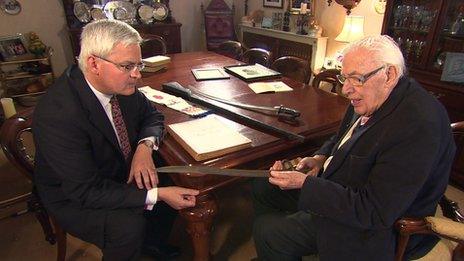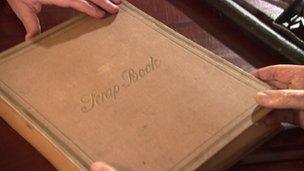Ian Paisley reflects on the Ulster Covenant centenary
- Published

Lord Bannside shows our political reporter the sword belonging to Fred Crawford who organised the gun running
BBC NI political reporter Stephen Walker meets Lord Bannside to discuss the anniversary of the signing of the Ulster Covenant.
When I arrive at Lord Bannside's Belfast home, I am greeted on the doorstep by his wife, Eileen, or Baroness Paisley to use her official title.
She knew I was coming and quickly ushers me into one of the front rooms where her husband is waiting.
He is ready for the interview but before we begin filming there is much to see.
Laid out on an impressive dining table, he has placed an array of memorabilia from the Home Rule crisis.
There are antiquarian books signed by his political hero, Sir Edward Carson.
There are rare cartoons from the period and framed portraits. There is also an original scrap book that details the drama and intrigue of the 1914 loyalist gun-running.
Then there are the weapons - two swords - one that belonged to Fred Crawford who organised the gun running and beside it sits a dummy wooden rifle that was once carried by one of Carson's volunteers.
The former first minister tells me he has had it in his possession for 50 years.
His display of Home Rule exhibits would not look out of place in a museum.
Lord Bannside is understandably proud of his collection and each item comes with a story of how he acquired it and who gave it to them.

There is an original scrap book that details the drama and intrigue of the 1914 loyalist gun running.
We begin by discussing the signing of the Ulster Covenant and what it means to him a century on.
He smiles, as it is clearly a subject that he has long considered and often discussed.
He tells me: "It is a tremendous story" and he adds that it would "never have happened without Edward Carson".
Throughout his political career Lord Bannside often compared himself to Carson, so I wanted to know if he believed he had always acted the way his hero would have behaved.
For example, did he think Carson would have approved of a power-sharing government with Sinn Fein?
"Yes I think he would", he tells me. He later adds that he thinks Carson would have viewed some modern day unionists badly as they are "weak on the preservation of the union".
Our discussion then moves onto how the centenary of the Covenant should be marked. He hopes Saturday's parade in Belfast will pass off peacefully.
He says it needs to be carefully handled, well organised and must be kept legal.
I press him on whether the Orange Order should have done more to reach out to resident groups.
Healthy
He rejects the suggestion because he believes that the Order have done all that could be expected.
He insists: "I don't think the Orange Order is aggressively opposing and hurting people."
He also feels that Order does not have to go and "bend the knee" to explain its actions.
He says the Loyal Orders have the right to walk past Catholic churches and play hymns provided they are not trying to "incite people".
I could not end our conversation without discussing his health.
Seven months after he was admitted to the Ulster Hospital with heart problems he looks healthy.
I ask him how he is and he replies "very well".
In what appears to be a challenge he says: "I don't look like a sick man, do I?"
Although his voice is quieter, in many ways he is like the Ian Paisley of old.
He still has a good line for journalists, and like his political hero Edward Carson, he insists he will always stick to his guns.
- Published27 September 2012
- Published26 September 2012
- Published18 September 2012
- Published6 September 2012
- Published11 July 2012
- Published28 August 2012